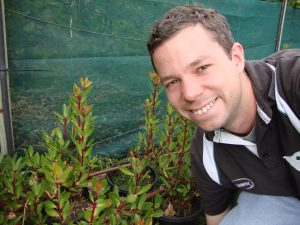
Tasmanian native pepper is a native plant of Tasmania and SE Australia whose fruit and leaves are harvested as “bushfoods”, famous for their rich aroma typical of the Australian bush. Its leaves can also be extracted for their plant extract components, and this extract is noted for its antifungal and antimicrobial properties which impart a crisp, spicy taste when used in food production. Native pepper is currently harvested almost exclusively from the wild, but the local industry believes that plantation production will generate both the yields and the consistency of quality necessary to significantly expand the industry. As native foods and flavours gain more attention and wider acceptance, new methods of production will be needed to meet greater demand, as well as quality and sustainability standards. Research to understand the growth of native pepper, and its potential for commercialisation in plantations, is vital for this ongoing success.
Dr Matthew Wilson has a PhD in Agricultural Science from UTAS where he studied the commercialisation of Tasmanian native pepper as a commercial crop species. He is now working for the ARC Training Centre for Innovative Horticultural Products, also at UTAS, investigating the effects of packaging on improving product freshness, shelf-life and food integrity. Matthew’s research has led to a better understanding of the science behind establishing plantations of local
